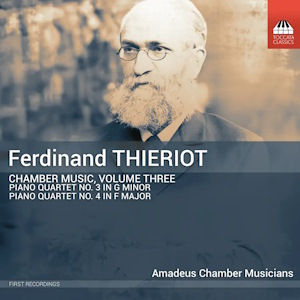
Ferdinand Thieriot (1838-1919)
Chamber Music – Volume 3
Piano Quartet No 3 in G minor (1905)
Piano Quartet No 4 in F major (1913)
Amadeus Chamber Musicians
rec. 2024, Hard Studio, Winterthur, Switzerland
Toccata Classics TOCC0739 [69]
Ferdinand Thieriot hailed from Hamburg and, like Brahms, was a pupil of Eduard Marxsen. He later went to study the organ with Josef Rheinberger in Munich and cello in Dresden with Friedrich August Kummer. For several years he worked as a teacher and music director in Hamburg. He was then appointed artistic director of the Steiermärkischer Musikverein of Graz on the recommendation of Brahms. He remained there for fifteen years. It was then to Vienna where he became director of the Bach Gesellschaft. He died in Hamburg in 1919.
His compositions include operas, cantatas, symphonic works and chamber music. Many consider the latter his finest work. This is Volume 3 in Toccata’s Thieriot chamber music series, and consists of the composer’s Piano Quartets 3 and 4. Volume 1 was reviewed by my colleague Rob Barnett back in 2010.
During the war Thieriot’s manuscripts were moved to eastern Saxony for safekeeping to protect them from allied bombing. They had previously been gathering dust in the Hamburg State Library. Later the Red Army took them to Leningrad. It was not until 1991 that they were returned to Hamburg, flood damaged, where they have since seen publication.
Thieriot’s first two piano quartets were early works. The Piano Quartet No. 3 in G minor came thirty years later in 1905. It was only published this year in 2024. It’s a delightful work, brimming over with a wealth of melodic material. The opening Allegro opens with an air of mystery and suspense. It sounds very Brahmsian to me, especially the piano writing. The Menuett that follows has a sprightly spring in its step. The slow movement is quite solemn and dignified, yet there are moments of tenderness and warmth. There’s plenty of energy and gusto in the exuberant finale.
Fast forward eight years and we have the Piano Quartet No. 4 in F major, dated 1913. Again, it only saw publication this year. It opens with serious intent. At times the mood is sombre, at others it rises to quite passionate intensity. An introspective and doleful Adagio follows. It’s only when we reach the third movement Scherzo that the general mood of the work becomes more upbeat. The finale begins subdued before a bouncy and buoyant theme enters. The quartet calls time with a demeanour that’s sunny and joyous.
The Amadeus Chamber Musicians deliver performances of high order and respond to these delightful and well-crafted works with virtuoso performances. Throughout, we hear sound of extraordinarily fine quality, and the liner notes do full justice to this top-notch production.
Stephen Greenbank
Buying this recording via a link below generates revenue for MWI, which helps the site remain free




















